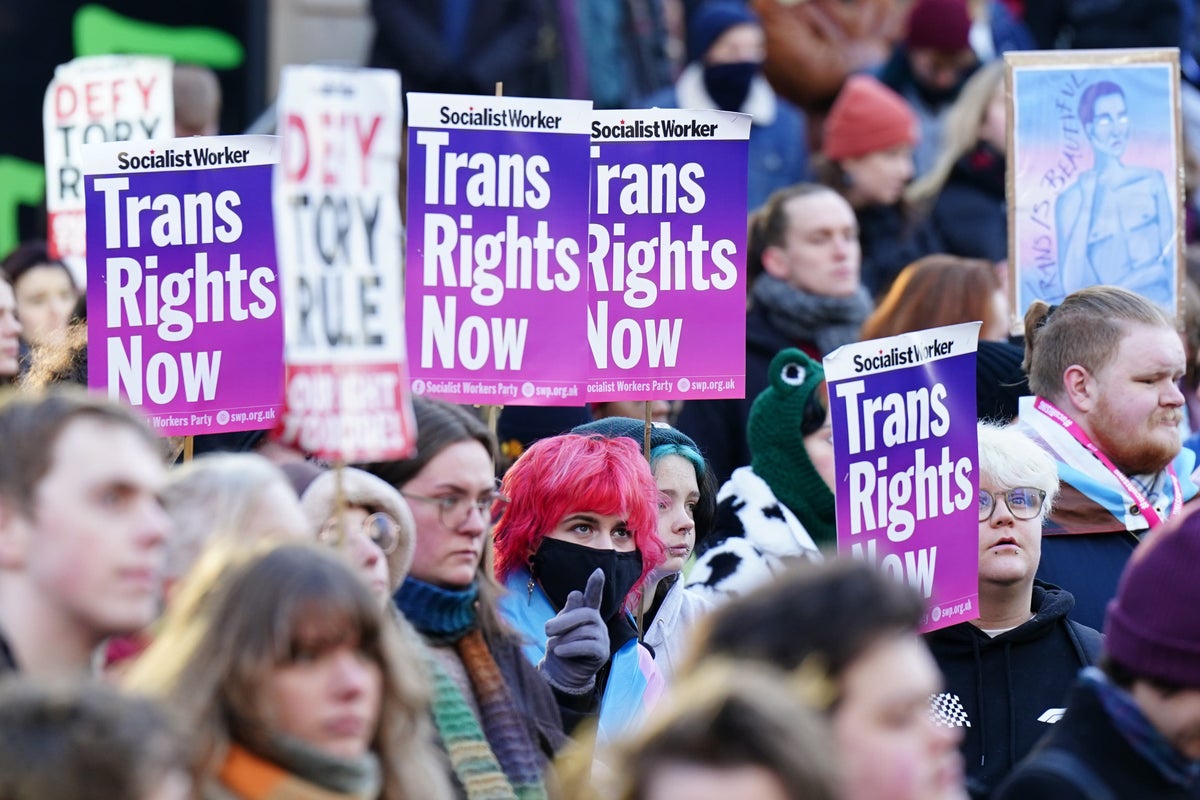
The UK Government is being challenged to revoke the order it has made that will prevent controversial reforms of the gender recognition process in Scotland from becoming law.
Scottish Social Justice Secretary Shona Robison argued that “immediately” revoking the order would “show the UK Government is serious about improving the lives of trans people and respecting Scottish democracy”.
Earlier this week, Scottish Secretary Alister Jack confirmed he would make a Section 35 order – using a never before utilised part of the legislation which set up the Scottish Parliament – to prevent the Gender Recognition Reform (Scotland) Bill from going forward for royal assent.
The move against the Bill, which was passed by MSPs less than a month ago, has prompted a furious reaction from the Scottish Government.
First Minister Nicola Sturgeon branded the move a “full-frontal attack” on the Holyrood Parliament and its ability to pass legislation on devolved matters.
Ms Robison has now called on Mr Jack to revoke the Section 35 order, labelling his actions “fundamentally disrespectful”.
Mr Jack has said the move is needed because the Scottish legislation – which would speed up and simplify the process for trans people to obtain a gender recognition certificate (GRC) – would have an “adverse impact” on the operation of equalities legislation in Britain.
As such, he insisted that blocking the Bill is the “necessary and correct course of action”.
The UK Government has urged Scottish ministers to bring forward amendments to the legislation, with Mr Jack saying this could provide a “constructive way forward” in the latest stand-off between the two governments.
But Ms Robison said UK ministers had not asked for any changes when the Bill was being considered by Holyrood.
She said: “At every stage of the Bill’s progress and development, the Scottish Government kept the UK Government informed through normal routes of engagement.
“At no point did they ask to amend the provisions in the Bill – neither during the extensive periods of public consultation nor during the drafting and parliamentary stages.
“The Scottish Parliament was treated the same way and did not hear from the UK Government during the passage of the Bill.
“Put bluntly, this was a one-way conversation up until the final moments this Bill should have gone for royal assent and become law.
“So for the Scottish Secretary to announce this week that he was unilaterally vetoing the Bill is fundamentally disrespectful to Scotland’s Parliament and the MSPs who have been part of its scrutiny, consideration and passing.”
She also claimed Mr Jack’s announcement was “harmful to trans people, who have waited long enough for improvements to apply for a gender recognition certificate”.
With the Scottish Government “still considering” the reasons given by Mr Jack for using the veto, Ms Robison was clear: “The Scottish Government is absolutely determined to vigorously defend the Bill and the democratic will of the Scottish Parliament.
“The Secretary of State says he wants to find a constructive way forward. If he really wants to work together in a partnership of equals, then he should acknowledge his announcement is completely incompatible with such a partnership, and he should immediately revoke the Section 35 order.
“That would show the UK Government is serious about improving the lives of trans people and respecting Scottish democracy.”
The legislation, which was supported by MSPs from all parties when it was passed in December, would allow trans people to obtain a GRC without the need for a medical diagnosis.
It would also cut the time they have to live in their acquired gender before obtaining the document, and reduce the age at which an application can be made to 16.
A spokesman for the First Minister said the Scottish Government would “do what we deem necessary to defend the Parliament and defend devolution”.
Regarding the call to discuss possible amendments to the Bill, he added: “We’re always happy to talk, but the First Minister has been very clear, it is not the job of UK Government to draft devolved policy.”
Meanwhile a UK Government spokesperson said it had “raised a number of concerns relating to the impact of the Scottish Government’s proposals with Scottish ministers as part of our constructive approach, in advance of the legislation passing”.
The spokesperson said: “The Secretary of State for Scotland has made an order under Section 35 of the Scotland Act 1998, preventing the Scottish Parliament’s Gender Recognition Reform (Scotland) Bill from proceeding to royal assent.
“This was done after thorough and careful consideration of all the relevant advice and the policy implications. This legislation would have an adverse impact on the operation of Great Britain-wide equalities legislation.
“Transgender people deserve our respect, support and understanding. Our decision is about the legislation’s consequences for the operation of GB-wide equalities protections and other reserved matters.”







